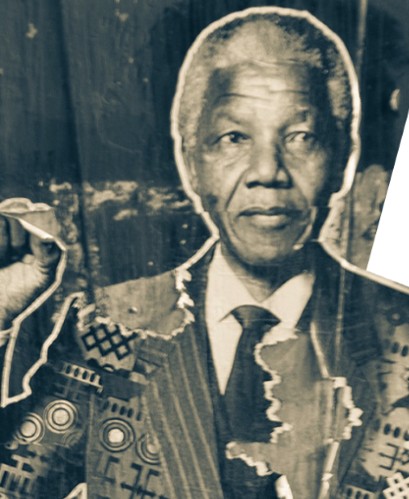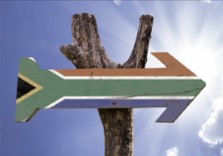
Think about the following questions.
1. What types of racial discrimination exist in your country?
2. Would you be willing to go to prison for a cause you strongly believe in?
3. How much do you know about Nelson Mandela and apartheid in South Africa?
VOCABULARY PREVIEW
Match each New Academic Word List(NAWL) word with the correct definition.
- inclusion
- formally _____
- hierarchy _____
- lifetime _____
- found _____
- coordinate _____
- a. the act or state of being made part of something
- b. to manage different elements of an endeavor in an efficient way
- c. in an official manner
- d. a system of ranking, usually in terms of power and importance
- e. the time during which a person is alive
- f. to begin or establish, especially an institution
MANDELA'S FIGHT AGAINST APARTHEID

Apartheid was a system of legal racial segregation1 enforced by the National Party government of South Africa between 1948 and 1990. It continued the more informal racial hierarchy put in place by Great Britain in the late 19th century. Apartheid formally allowed the ruling white minority in South Africa to segregate and discriminate against the vast majority: black Africans mostly, but also Asians and other people of mixed races. Under apartheid laws, black South Africans were not only denied voting rights but were also forced to stay in small sections of the country. Travel was only possible with "pass books" designed to regulate the movements of black Africans in urban areas. It was during these times that Nelson Mandela rose up as a major speaker against the injustice of apartheid.
In 1944, Mandela joined the African National Congress (ANC), a political party formed to increase the rights of the black South African population. At that time, the ANC worked relatively quietly for more legal inclusion. But under the Program of Action started in 1949, it began boycotts2, strikes, and civil disobedience3 against apartheid. In 1952, as volunteer-in-chief for the ANC's Campaign for the Defiance of Unjust Laws, Mandela organized the fight against apartheid discrimination. This led to a criminal conviction but also increased respect from his peers. He was then elected a deputy president of the ANC.
During this period, Mandela came to the conclusion that violence was inevitable4 since the government met peaceful demands with force. Thus, in 1961, he helped form Umkhonto we Sizwe ("Spear of the Nation," abbreviated as MK). With MK, Mandela coordinated sabotage5 campaigns against military and government targets. Mandela also raised funds for MK abroad and arranged for paramilitary6 training of group members.
In 1962, Mandela traveled abroad illegally to gather support for the anti- apartheid struggle. Upon his return, he was arrested, convicted of crimes in two separate trials, and handed a life sentence. But Mandela continued to demand equality from within the confines of Robben Island Prison.
Mandela rejected an offer of release on the condition that he renounce7 armed struggle by stating, "What freedom am I being offered while the organization of the people remains banned? Only free men can negotiate. A prisoner cannot enter into contracts."
Mandela firmly believed that the struggle for freedom was not only for the oppressed but also for the oppressors8. "A man who takes away another man's freedom is a prisoner of hatred," wrote Mandela in his autobiography. “He is locked behind the bars of prejudice9 and narrow-mindedness10. I am not truly free if I am taking away someone else's freedom, just as surely as I am not free when my freedom is taken from me. The oppressed and the oppressor alike are robbed of their humanity."
After twenty-eight years in prison, Mandela was released in 1990. The following year, he became president of the ANC. In 1993, he was awarded the Nobel Peace Prize for helping to end apartheid. Finally, in 1994, Nelson Mandela was elected president of South Africa and remained in that office until June 1999, when he stepped down by choice after serving one term. He remained active in the philanthropic organizations he had founded and continued speaking on international issues. From 2004, Mandela largely withdrew from public life, enjoying the privacy that had been elusive during a lifetime of tireless activism. Then, in 2013, he finally succumbed to11 the respiratory problems that had begun decades before in prison. When he passed away, he left a legacy on a par with that of Gandhi and Martin Luther King, Jr.
New Academic Word List
- segregation 1 : n. the separation or isolation of a race, class, or ethnic group
- boycott 2 : n. a situation in which people refuse to buy or use something as a form of protest
- civil disobedience 3 : n. the refusal to obey unjust laws as a form of protest
- inevitable 4 : adj. unavoidable; surely going to happen
- sabotage 5 : n. the act of destroying or damaging something deliberately so that it does not work correctly
- paramilitary 6 : adj. of or relating to a fighting force patterned on military training
- renounce 7 : v. to give up or refuse, especially by formal declaration
- oppressor 8 : n. a person who holds down or restrains others
- prejudice 9 : n. unreasonable feelings, opinions, or attitudes regarding a racial, religious, or national group
- narrow-mindedness 10 : n. the quality of lacking tolerance
- succumb to 11 : v. to die from
READING COMPREHENSION
A ‣ Mark each statement as true (T) or false (F) according to the reading.
- The African National Congress was formed to fight for black people's rights.
- True
- False
- Nelson Mandela was found guilty of breaking the law while volunteering for the ANC.
- True
- False
- Spear of the Nation was a non-violent protest group.
- True
- False
- Mandela argued that oppressors hurt themselves as well as others.
- True
- False
- Mandela served as South Africa's president until his death.
- True
- False
B ‣ Choose the best answer according to the reading.
- What is the main purpose of the reading?
- a. To relate the major events in Mandela's political life
- b. To explain the history of modern South Africa during Mandela's lifetime
- c. To show the injustice of the apartheid system through Mandela's hardships
- d. To illustrate the tension between Mandela's personal and professional obligations
- What was the purpose of "pass books" under apartheid?
- a. To monitor minorities' voting rights
- b. To check black people's bank accounts
- c. To regulate black people's movements
- d. To allow minorities to stage boycotts
- The word it in paragraph 2 refers to _____.
- a. the ANC
- b. a program
- c. a time period
- d. legal inclusion
- Which was NOT used under the Program of Action?
- a. Strikes
- b. Sabotage campaigns
- c. Boycotts
- d. Civil disobedience
C ‣ Find the correct numbers in the reading and write them on the lines.
- _____: the number of years Mandela spent in prison
- _____: the year Mandela won the Nobel Peace Prize
- _____: the number of terms Mandela served as president
SUMMARY
An introductory sentence for a brief summary of the passage is given below. Choose three more sentences to complete the summary.
First Sentence: Nelson Mandela became a historic figure as a result of helping South Africa end apartheid, its system of racial segregation.
-
- 1 Apartheid affected not only black people but also South Africans of Asian descent.
- 2 After apartheid, Mandela was elected president, won the Nobel Peace Prize, and continued his philanthropy and activism for several years.
- 3 Mandela negotiated for more rights as a member of the African National Congress and then joined the more militant Spear of the Nation.
- 4 Apartheid was a stricter version of the racial segregation established by Great Britain in the 1800s.
- 5 Even after his conviction and imprisonment in 1962, Mandela continued to speak out against injustice until he was released in 1990.
- 6 While in prison, Mandela protested because black prisoners were being discriminated against.
VOCABULARY PRACTICE
Fill in the blanks with the words in the box. Change the form if necessary.
- coordinate
- formally
- found
- hierarchy
- inclusion
- lifetime
- Inaddition to formulating overall strategy, a general has to _____ the actions of many different divisions to achieve military goals.
- Oxford University was _____ in the 11th century, making it the oldest university in the English-speaking world.
- After a(n) _____ of smoking, the man’s lungs were literally black on the inside.
- Democracy is all about the _____ of ordinary people in the political process.
- Like packs of dogs, school-age children will naturally form a(n) _____ when left to organize their own games.
- Although he _____ held no office, the president's brother had a huge influence on the nation's affairs.
SUPPLEMENTAL READING
Pure Democracy

Nelson Rolihlahla Mandela was born on July 18, 1918, in the small South African village of Qunu. His father, Henry, was chief counselor to the tribe's leader and also a sort of unofficial priest.
Mandela's father rejected the prejudice that those in his tribe, the Xhosa, held against the Mfengu tribe, who were better-educated and more “Western” than other tribes of the region. Chief Henry befriended two Mfengu brothers, George and Ben Mbekela. George, a retired schoolteacher, suggested Rolihlahla be sent to school. There he was given the English name “Nelson” in accordance with the usual custom in South African schools at the time.
When Mandela was twelve years old, his father died. The tribe's leader, Dalindyebo, became Mandela's guardian and began grooming him for leadership. Mandela attended tribal meetings where issues of concern to all village citizens were discussed and voted upon. Mandela observed how Dalindyebo would open meetings by addressing his amapakati, or “middle ones,’ who were sent to represent the interests of local clans. After explaining why the meeting had been called, Dalindyebo would give the floor to the amapakati. Then he would remain silent until each person had spoken.
Even when meetings became hostile, Dalindyebo would listen patiently until all opinions had been voiced. He would then help the group to achieve a consensus. Mandela credits his early exposure to this process, “democracy in its purest form,’ for his later principles and practices as a political activist and leader.
Fill in the blanks with information from the reading.
- Mandela's father opposed discrimination against _____ .
- After Mandela's father died, Dalindyebo began preparing Mandela for _____ .
- Dalindyebo would listen to everyone's opinions and then help the group work toward a(n) _____ .






















Leave a comment
Load more